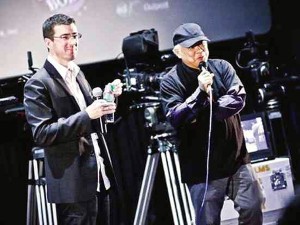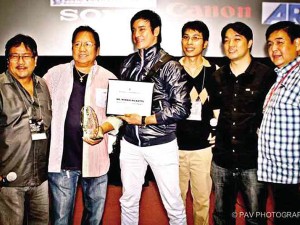Metro Manila Film Festival crosses the digital divide

RED’S Ryan Erwin (left) and Digital Magic’s Percy Fung field questions from students during a recent workshop on digital migration. Photo courtesy of Tony Y. Reyes
For the first time in its 39-year history, Metro Manila Film Festival (MMFF) entries will all be shown in digital cinemas.
By December, all cinema chains in the country would have converted from
35-mm film to digital projection, said Tony Y. Reyes, the director behind the lucrative “Enteng Kabisote” franchise.
So, is the movie industry ready to cross the digital divide?
Insiders believe there is still a lot of work to be done before the local film industry can totally adapt to the technological changes and challenges.
Article continues after this advertisementFor precisely this reason, the Multimedia Entertainment Arts Foundation (MEA) held the three-day “Movie Production for Digital Migration” workshop at SM North Edsa recently.
Article continues after this advertisementThe workshop panelists, both local and foreign, underscored the importance of standardizing practices and procedures to make the digital workflow more efficient and effective.
John Tan, MEA officer, emphasized the need to streamline the ranks of postproduction companies (including Outpost, which he heads). Filmmakers and producers, he said, should collaborate only with “credible and trustworthy postproduction firms that would provide top quality service.”
The difference
Any enterprising young man with a laptop can claim to be a one-man postproduction firm, but there would surely be a difference in quality, depending on expertise, noted Tan.
Raised during the workshop were issues that affected the last MMFF. One film had a problem with the framing of scenes that could not be solved in postproduction. This case emphasized the need for strict quality control as early as the filming stage, to prevent headaches down the line.
Another movie company decided to cut costs by skipping one part of the DCP (Digital Cinema Package) process.
(Digital Cinema Package is a collection of digital files used to store and play movies in digital cinemas. DCPs usually come in a hard disk format.)
“The production company thought a mere USB would do,” Tan recounted.
(A USB is a universal serial bus, a connection technology for attaching devices to a computer, providing fast data exchange.)
On opening day, the DCPs conked out—resulting in significant losses at the tills.
Such debacles could be easily avoided by adhering to a consistent and conscientious work process, Tan said.
His Outpost has had considerable experience when it comes to festival films—whether for the art-house, commercial or international scenes.
Outpost worked on several Cinemalaya finalists (including the Venice—winning film, Pepe Diokno’s “Engkwentro” in 2009).
For last May’s Cannes International Film Festival, Outpost did the postproduction work on two Philippine entries—Adolfo Alix Jr’s “Death March” and Lav Diaz’s “Norte, Hangganan ng Kasaysayan.”

FILM Academy of the Philippines’ Leo Martinez (left), Optical Media Board’s Ronnie Ricketts (third from left) with MEA’s Tony Y. Reyes, John Uy, John Tan and Clayton Olalia Photo courtesy of Tony Y. Reyes
Backup is important
For the Cannes films, Outpost made three DCPs each for the two films. “Two copies were shipped to France and one was hand-carried by the filmmaker. Backups are important.”
Tan watched “Norte,” a four-hour film, seven times, to make sure every image was perfect, every sound and dialogue in sync.
For MMFF 2013, Tan advised producers to have multiple DCPs and spares as well— in anticipation of problems that may arise due to the holiday rush.
“For example, Direk Tony, for his ‘Enteng’ movies, prefers to ingest (load DCP into the theater’s DCP server) in all cinemas ahead of schedule, even before he gets the final list of assigned theaters (for each entry) from the MMFF executive committee,” Tan explained. “If his film will not be shown in a particular cineplex, the moviehouse management can just ignore his DCP.”
This strategy prevents last-minute scrambling and gridlock in ingesting films.
Various industry stakeholders—from filmmakers to producers, from theater owners to postproduction technicians— participated in the discussions during the workshop.
“It was an eye-opener,” said Reyes.
Experts from Digital Magic Hong Kong (Percy Fung), Red digital cameras United States (Ryan Erwin), Cine Equipment Singapore (Ivan Tan), Technicolor Thailand (Christian Cortez, Warren Santiago and Chon Sirikhunt) and Optima Digital Philippines (Marilen Magsaysay and Marc Ambat) were among the speakers.
The MEA is now finalizing follow-up workshops to focus on other aspects of the digital work process. Next in line is an in-depth seminar on Arri Alexa cameras.